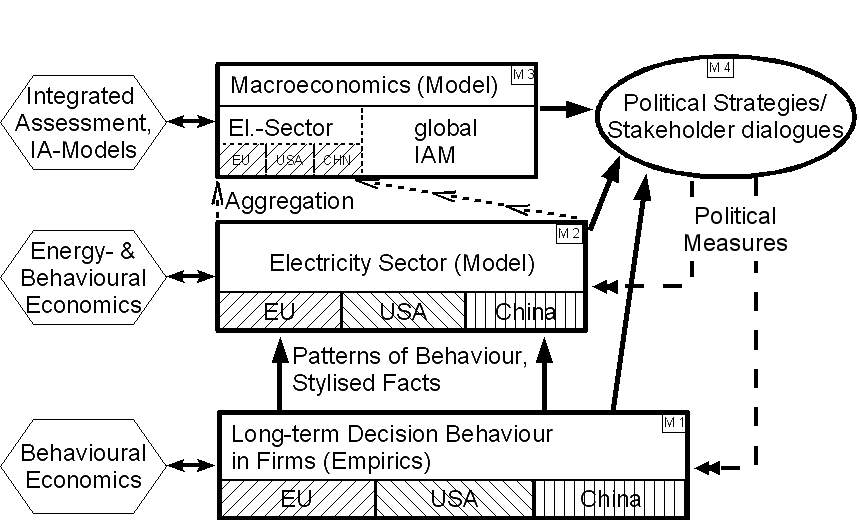
ALICE
Agents' Long-term Investments in the context of Climate and Energy
Well-documented results from behavioral economics show, that individuals' decisions systematically deviate from what the rational actor (aka "homo oeconomicus") of standard economic theory would do. Examples are time preferences (i.e. the valuation of future earnings and costs), or the common overconfidence in one's own capabilities.
The aim of the ALICE project is to investigate whether these deviations from the homo oeconomicus are also to be observed among company decisions, in particular when it comes to long-term investments in the electricity sector. This will not only have an impact on decision theory, but also influence strategies to protect the global climate.
We will address the issue on thress levels  (click graphics to enlarge):
(click graphics to enlarge):
- On the micro level we'll address actual company decisions via qualitative case studies and econometric methods. Our goal is to find those factors that are crucial to investment decisions, with special attention on technoliogy choice and path dependencies. Based on literature analysis, available data and interviews with industry experts we'll first explore given market and industry structures. In a second step, selected investemnt decisions will be analyzed in more detail by qualitatively interviewing company representatives of companies in the elctricity sector. The regional focus is initially on Europe, but it is planned to extend it to China and the U.S.
- On the sectoral level we'll investigate the impact of the empirical results on the electricity sector as a whole. Our goal is here to develop instruments to efficiently improve climate protection measures. To this end, the empirical findings shall be aggregated into a model of the electricity sector that can in turn be used to validate these findings. This model could then be used to develop sectoral climate protection strategies.
- On the global level we'll look for implications for climate politics by coupling the sectoral model with a global integrated assessment model (IAM). Our goal is to provide more reliable inputs for decisions in climate politics. The sectoral model will help to improve the energy sector module of the REMIND IAM. Since macro-economic models like REMIND are designed to investigate differences in regional development, or trade effects, this will allow to analyze the impact of behavioral effects on a macro-economic scale. Special attention will be given to induced technological change (ITC) and coaltion formation of major CO2 emitting countries.



